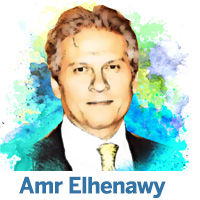Military force is exhibiting its role in international politics: The news is full of missile and drone strikes, civilian deaths, cities reduced to rubble, and thousands forced to flee before occupying armies. Hardball economic negotiations are also in the news: Threats are made to cancel trade agreements, impose punitive tariffs, apply sanctions, or seize assets. International organizations are sidelined, while humanitarian crises spiral out of control.
 In the 1990s, no one in Washington or in European capitals expected the 21st century to be like this.
In the 1990s, no one in Washington or in European capitals expected the 21st century to be like this.
Back then, Western policymakers anticipated a benignly peaceful future. In the 1990s, also, American policymakers were sure the number of the world’s liberal democracies would increase. Organizations such as America’s National Endowment for Democracy committed to the spread of liberal democratic values, believing they were making the world safe for democracy and for peace.
As they thought about the future, American policymakers invested heavily in the concept of “soft power”. Their idea was that the cultural image and moral appeal of the United States were key to its geopolitical status, giving it greater diplomatic heft and more ability to work its will in international arenas.
The idea of soft power led to cuts in military budgets and increased expenditures on foreign aid, cultural exchanges, and humanitarian initiatives. Moreover, as threats of war seemed to dwindle, there seemed little reason to maintain national defense industries. Ships, tanks, and artillery shells seemed either unnecessary in the coming era of global peace or outdated by precision guided weapons.
Today, all these late 20th-century expectations have collapsed. The US quickly rediscovered its appetite for nation-building in distant societies. America’s wars — witness Afghanistan and Iraq — were neither short nor cost-free.
The US has cut several of its diplomatic missions in the Global South, and the Trump administration’s budget for 2026 would end all peacekeeping payments to the United Nations and pause most other UN contributions. Symbolically, the US Department of Defense has been renamed the Department of War. A bipartisan consensus supports rebuilding the nation’s industrial base to permit large-scale rapid production of weapons for prolonged or high-intensity conflicts.
The most prominent casualty of the new focus on armaments is soft power. In the US, the US Agency for International Development budget and funds for development and cultural outreach have been slashed, and State Department programs assisting development of civil society seem likely to be eliminated. In Europe, too, soft-power programs are major losers: Germany, France, the Netherlands, and the United Kingdom have all cut back on development aid, cultural diplomacy, and humanitarian assistance.
Is the 21st century world becoming one in which only might makes right? Are there no costs to “hard power”, to the use of force and threat, to economic bullying, and casual disregard of diplomatic conventions?
Nations that get their way by coercion, whether military or economic, may be feared, but they are unlikely to be trusted or admired. Their dependence on force costs them moral authority. Surveys of international public opinion suggest that bellicose nations lose the respect and esteem of the people of other countries. But is that important? One remembers that global opinion did nothing to halt 20th-century aggressors.
Two 21st-century developments are opening international politics to much greater popular involvement and increasing the effectiveness of mass opinion. For the first time in history, billions of people are seeing what war is like: Images on television and online are conveying its horrors and stirring the emotions of people far away from the conflicts. The profound diplomatic isolation of Israel proves the power of opinion energized by images of the suffering in Gaza.
Tourism, creating millions of peaceful people-to-people interactions every day, is the new soft power of international politics. It’s time to recognize tourists as the 21st century’s best ambassadors for peace in a troubled world
The 21st century has also seen huge numbers of people visiting and learning about other countries. Foreign travel, once mostly limited to the affluent, is now a middle-class, even a mass, activity. Around 1.5 billion international arrivals are expected in 2025. Tourists evaluate their experiences while abroad and communicate them to their friends and business associates. The result is that more people in every country know about the outside world than ever before.
I travel for business routinely between China and the Middle East. On every trip, I meet tourists who are happily on their way to or from countries they once thought they would never see. Chinese tourists in Dubai, on their way back from Oman, tell about their joy in experiencing traditional Arabic culture in Muscat. Or Egyptian tourists, returning from China, talk about Beijing’s Palace Museum, comparing it with Cairo’s new Grand Egyptian Museum.
But tourism is about very much more than sightseeing and awareness of other cultures. Meeting people from other countries teaches lessons in mutual understanding and common humanity.
Tourism, creating millions of peaceful people-to-people interactions every day, is the new soft power of international politics. It’s time to recognize tourists as the 21st century’s best ambassadors for peace in a troubled world.
The author is former consul general of Egypt to the Hong Kong and Macao special administrative regions.
The views do not necessarily reflect those of China Daily.


